Food from Thailand is often recognized as some of the best in the world.
The variety of Thai cuisine, especially its world-acclaimed street food, is astounding, but mainly covers noodles, stir-fries, curries, soups and salads, available anywhere from mobile food carts to Bangkok’s Michelin-starred restaurants. For the best Thai food, here’s our recommended top must-try dishes.
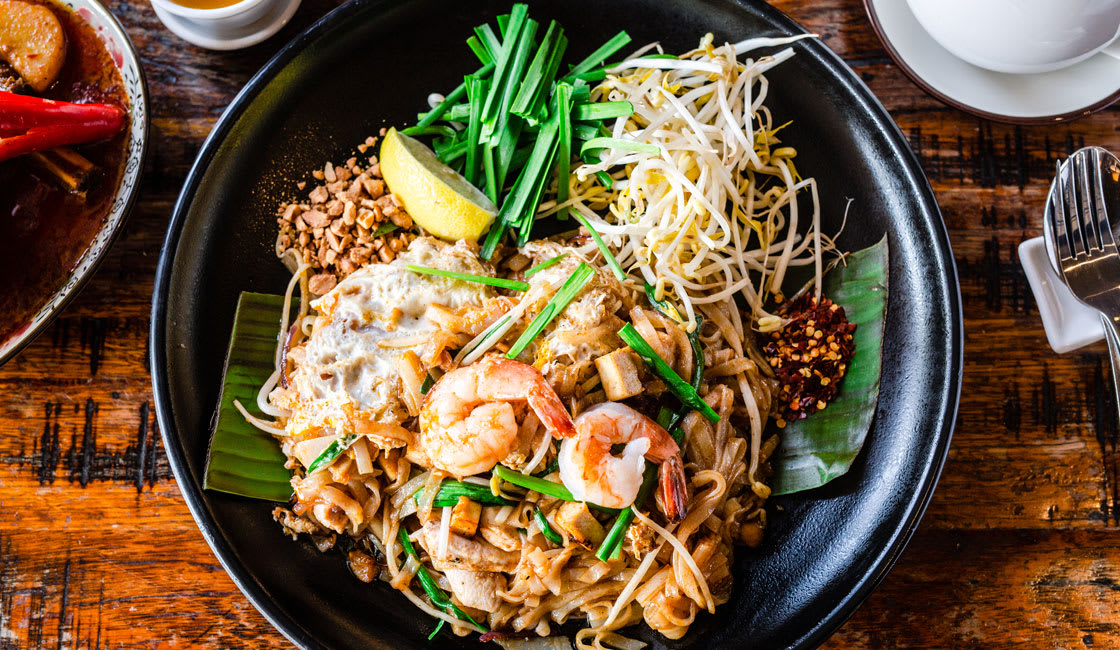 1. Pad Thai (Stir-Fried Noodles)
1. Pad Thai (Stir-Fried Noodles)
Thailand’s noodle dishes were introduced by Chinese immigrants and arguably, Pad Thai ranks as the most celebrated all. This signature dish is a great go-to introduction to Thai food as it’s not too spicy. Similar to many dishes, Pad Thai varies regionally, but is classic ingredients of flat rice noodles, seafood (alternatively, chicken, pork, or tofu), dried shrimp, tamarind, fish sauce, bean sprouts, shallots and egg, all stir-fried in a hot wok, plated-up and sprinkled with roasted peanuts, fresh herbs and chilis (optional). Pad Thai epitomizes that Thai trademark sweet, sour and salty combo of flavors and well-balanced texture contrast.
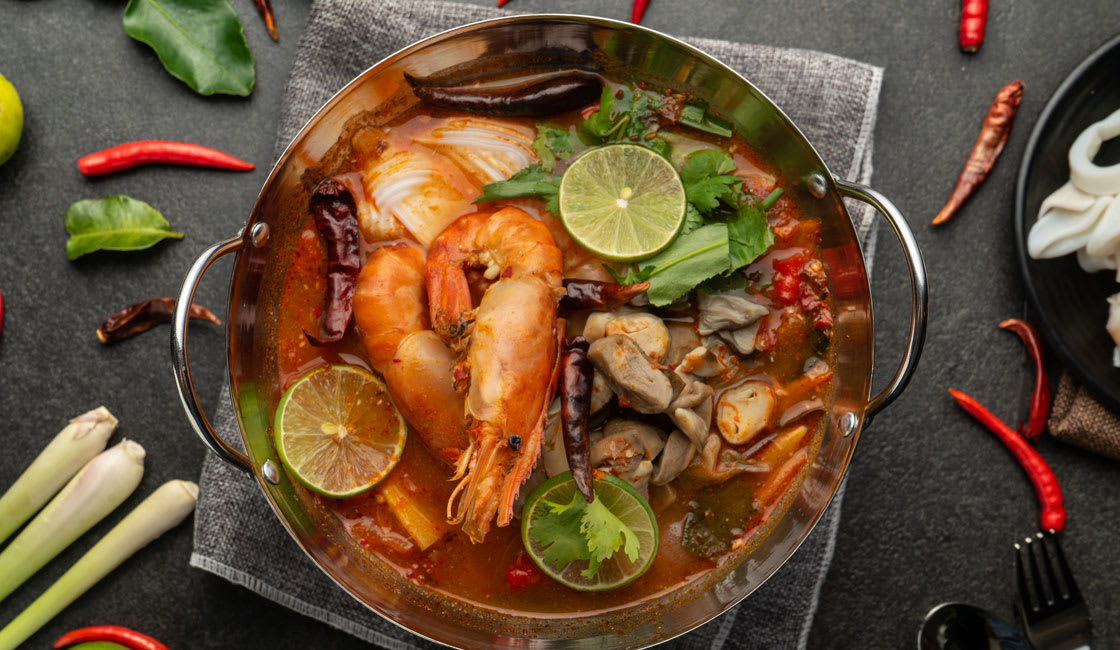 2. Tom Yum Goong (Hot & Sour Shrimp Soup)
2. Tom Yum Goong (Hot & Sour Shrimp Soup)
One of Thailand’s most iconic dishes, this popular soup is a spicy, sour and aromatic tastebud extravaganza! Hailing from the central region, the unique flavors of this piquant clear soup derives from the marriage of fragrant lemongrass, shallots, fish sauce, galangal, mushrooms, kaffir lime leaves, lime juice and red chili peppers. Although shrimp (Goong) is most commonly used – regarded as the most delicious version – other variations cover chicken, fish or mixed seafood. If you find this all too spicy, northern specialty, Thai chicken coconut soup, lends a milder, sweeter and delicious alternative; it has the same sublime flavors and spices, yet the chilies are optional and the creamy coconut milk tempers the heat.
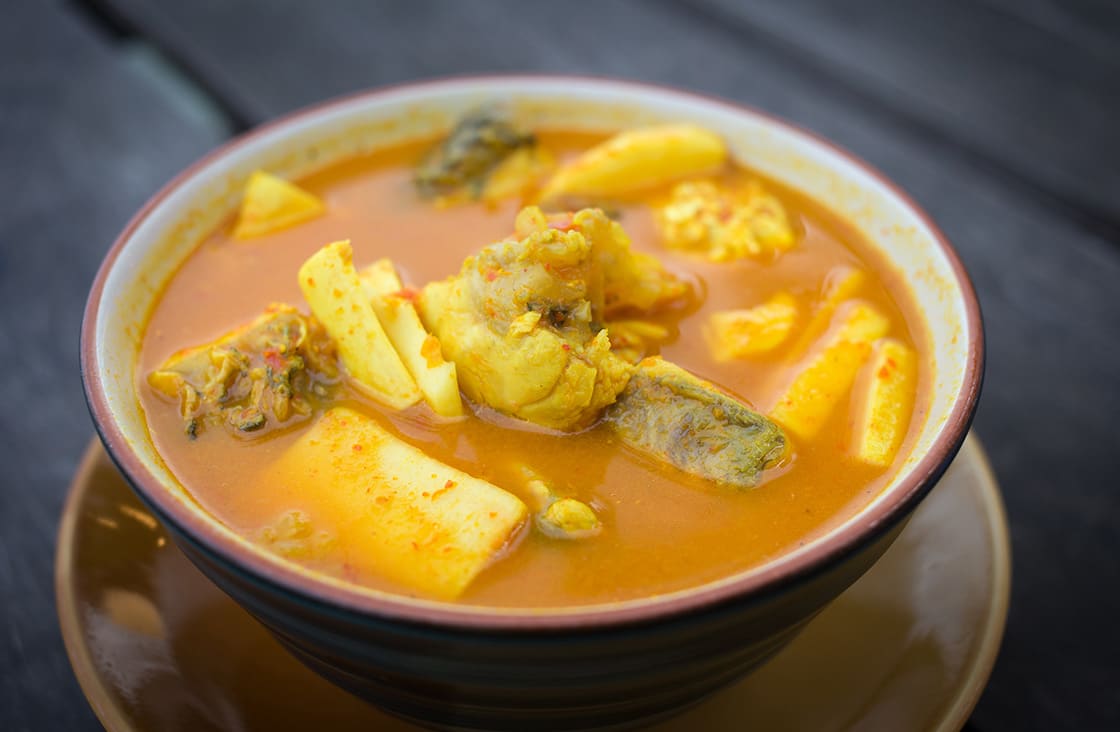 3. Kaeng Lueang (Yellow Curry)
3. Kaeng Lueang (Yellow Curry)
Thailand’s world-famous curries range from mild to explosive and sweet to sour and invariably concocted with coconut milk, present a soup-like consistency. There are endless regional varieties, but the three main curry types, red, green and yellow are the best known internationally, with differences according to spiciness levels and dominant ingredients.Yellow curry has a strong southern Thai influence, with a rich texture and characteristic hue derived from generous use of turmeric. This is pounded together with classic aromatic ingredients which usually cover coriander, cumin, shallots, lemongrass and galangal. Coconut milk, vegetables and potatoes are added, along with chicken, or alternative protein or tofu options. As this curry type generally contains less chilies, it isn’t so spicy as its green and red curry counterparts, thus suitable for those – including children – who prefer a mellower taste.
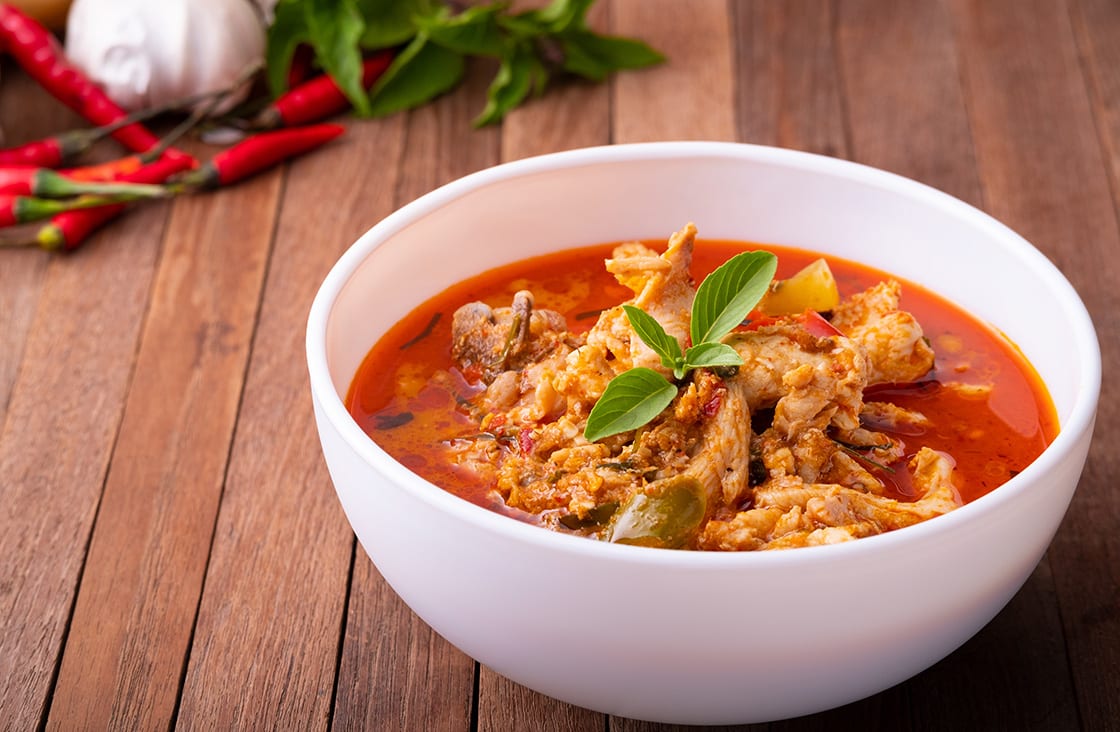 4. Gaeng Daeng (Red Curry)
4. Gaeng Daeng (Red Curry)
One of Thailand’s most common curry varieties, red curries are a happy medium: generally spicier than yellow curries but less so than the green varieties. The distinctive red color of this rich, sweet and aromatic curry comes from crushed red chilies in the curry paste (a base of garlic, shallots, blue ginger and lemongrass), which is added to coconut milk, vegetables, such as eggplant, mushrooms, or tomatoes and chicken breast slices. The curry is topped off with finely sliced kaffir leaves and sweet basil, presenting a perfectly balanced combo of creamy and spicy broth to get those tastebuds tingling.
One of the best-known red curry varieties, Massaman Chicken Curry, is mild, sweet and simmered in coconut milk; however, is unusual for its less soupy consistency and interpretation of a traditional Persian dish and Indian curry, made with roasted spices.
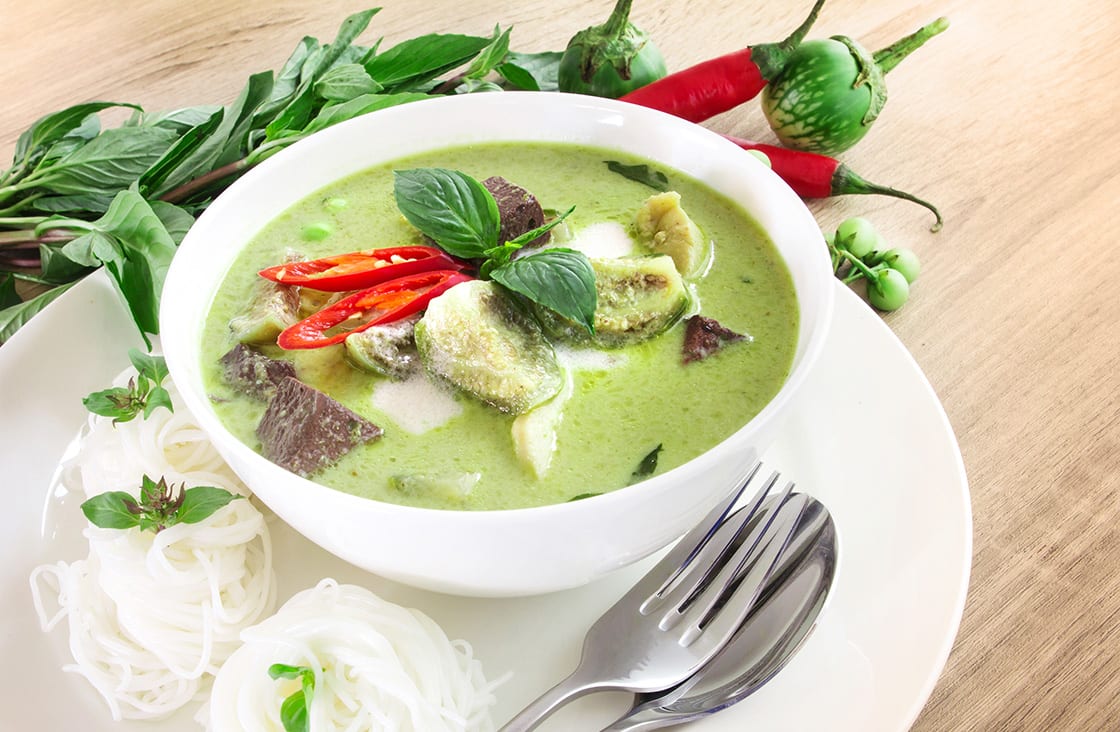 5. Gaeng Keow Wan Gai (Green Curry)
5. Gaeng Keow Wan Gai (Green Curry)
Originating from Central Thailand, green curry is the spiciest of the Thai ‘holy trilogy’ and arguably, most familiar world-wide. This hugely popular dish is centered on fragrant green chilis– introduced to Thailand by Portuguese missionaries in the 16th century – giving the dish its distinctive green hue and fiery taste. Although simmered with coconut milk (toning things down somewhat, creating a rich, sweet nuance) and incorporating ingredients similar to many Thai curries (galangal, shallots, lemongrass, kaffir lime, Thai basil, etc), it’s those green chilies that make this dish seriously spicy. Green curry is also distinctive for its inclusion of mini eggplants, potatoes, bamboo shoots and slivers of chicken breast.
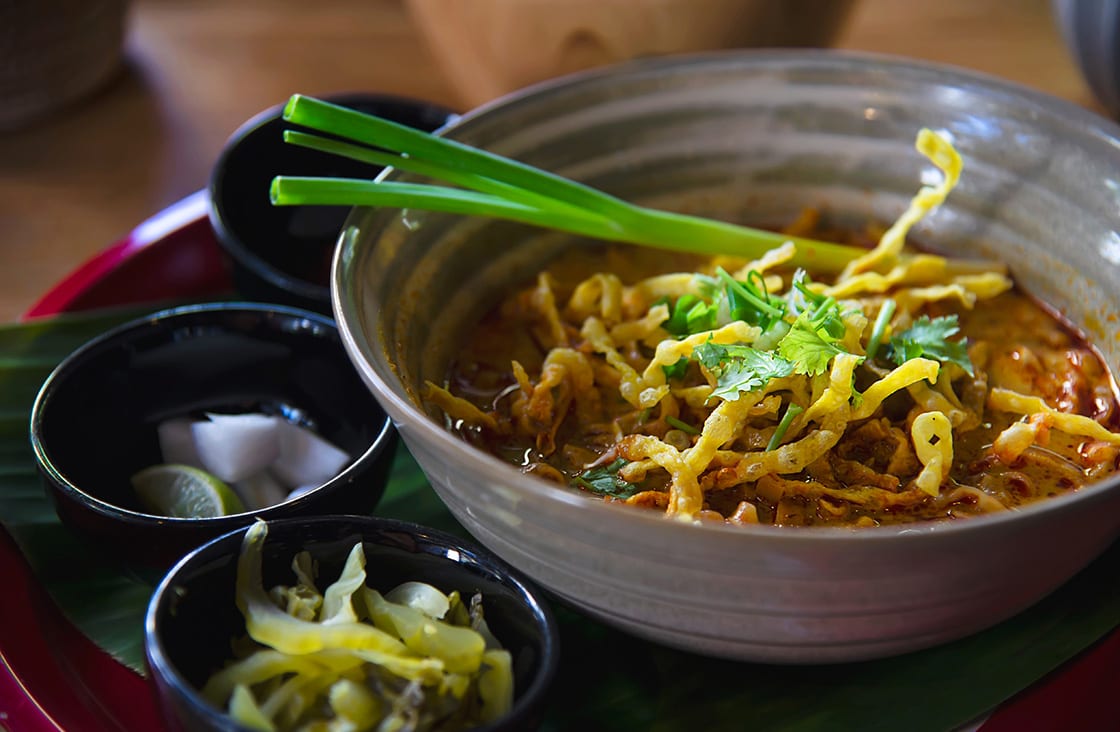 6. Khao Soi (Thai Coconut Curry Noodle Soup)
6. Khao Soi (Thai Coconut Curry Noodle Soup)
Noodle soups are a popular street food dish, served any time of day or night across Thailand. One of the best loved varieties is Khao Soi (or Soy), a signature Northern Thailand dish, especially revered in Chiang Mai. This Burmese-inspired soup is iconic for its mild spicy and fragrant curry broth with a rich coconut milk base, soft egg noodles and either chicken, beef or tofu, topped with deep-fried crispy egg noodles, pickled vegetables and sliced shallots. Khao Soi is delicious, comforting and slightly spicy, sweet and creamy, all in one mouthful!
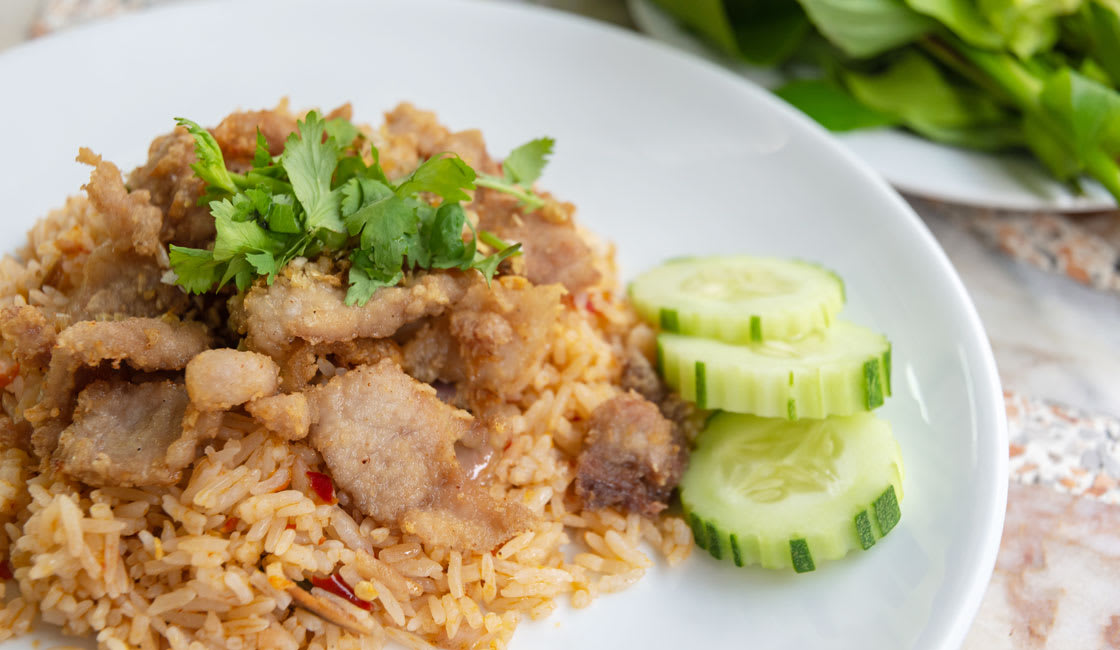 7. Khao Pad (Thai Fried Rice)
7. Khao Pad (Thai Fried Rice)
This Thai fried rice dish is a classic, go-to favorite for locals, served anytime, but especially for lunch. Khao Pad is made with either chicken, pork, beef, seafood or tofu, together with eggs, onions, garlic, fish sauce, fresh herbs and tomatoes or other vegetables. These ingredients are all stir-fried with fragrant Jasmine rice until blended well together, served with cucumber slices, lime wedges and other condiments. As this relatively simple dish can be made to order, you’re in control of the heat factor and additional flavors – ideal for fussy eaters or those looking for spice relief. The pineapple and shrimp variation, Khao Pad Sapparod, makes a mouthwatering alternative.
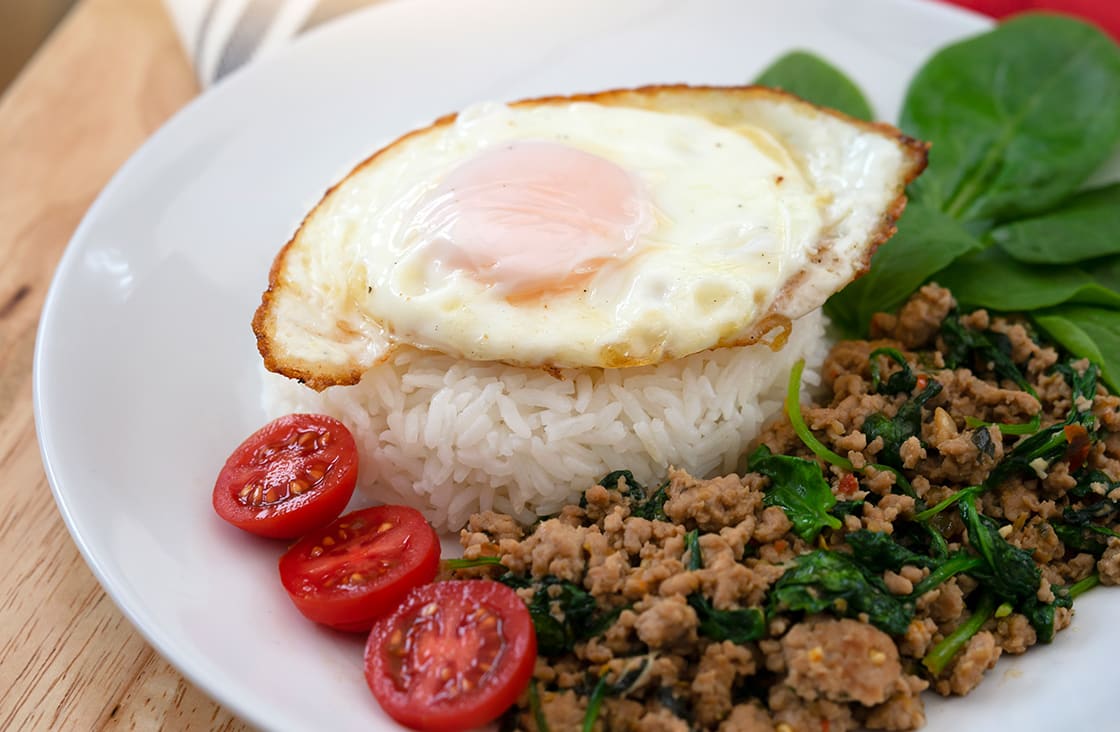 8. Pad Kra Pao Moo (Stir-Fried Thai Basil & Pork)
8. Pad Kra Pao Moo (Stir-Fried Thai Basil & Pork)
A popular ‘one plate’ lunch or dinner dish frequently ordered in Thai restaurants, Pad Kra Pao Moo presents a tasty sweet- spicy balance. Fresh chilies, garlic, green beans, shallots, fish sauce and palm sugar, along with minced pork and peppery basil leaves are all stir-fried in a searing hot wok, piled onto a plate of steamed white rice then crowned with a fried egg. The pork meat can be substituted with minced chicken, beef, duck, seafood or tofu.
9/ Som Tam (Spicy Green Papaya Salad)
Arguably Thailand’s best-known salad dishes, Som Tam is thought to have originated in Laos, but now stands as a yummy north-eastern specialty and amongst Thailand’s most beloved dishes. Not your typical salad, Som Tam comes in various guises. However, the classic recipe is usually made with shredded green papaya, red chilies, fish sauce, lime juice, tamarind pulp and palm sugar, mixed with vegetables such as cherry tomatoes, carrots and runner beans, with roasted peanuts and dried shrimp added for nutty and crunchy textures. These are all pulverized in a pestle and mortar, resulting in a distinctive, sweet, savory, spicy, salty and sour taste. For a whole new flavor dimension, regional variations cover the addition of fermented crab or papaya substituted for mangoes.
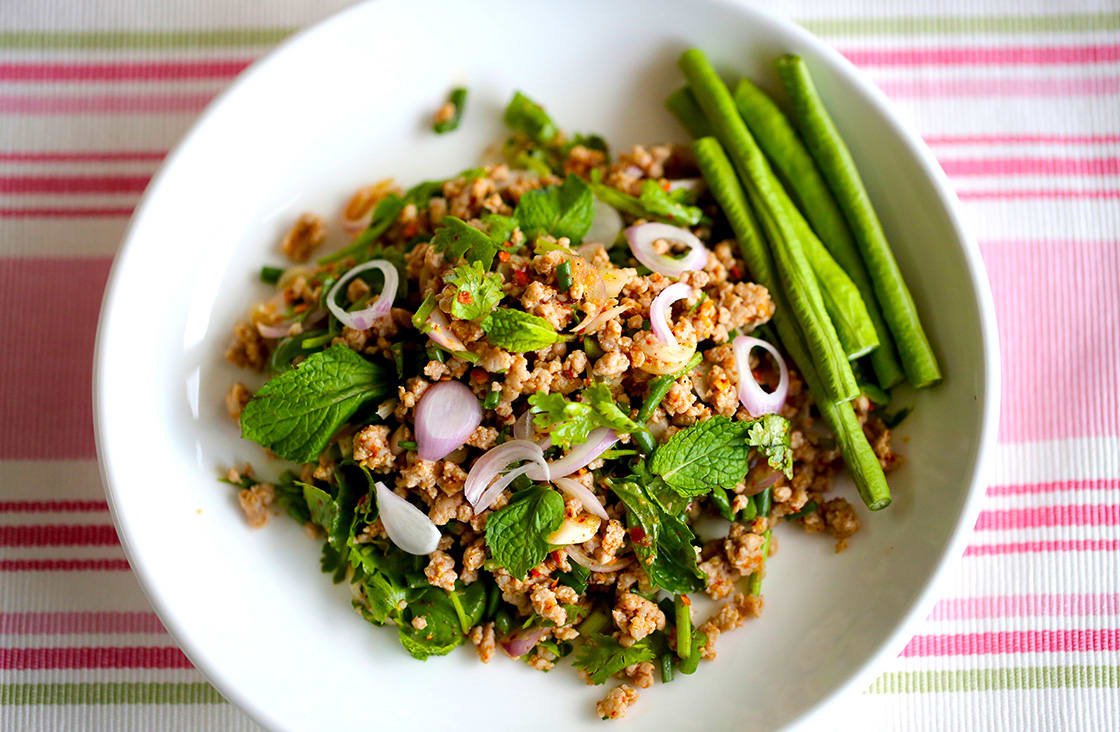 9. Laab (Spicy Salad)
9. Laab (Spicy Salad)
Another north-eastern signature is Laab (or larb), which, with its hot, salty and spicy combustion of flavors, is, similar to Som Tam, typical of this culinary-rich region. Also originating from Laos, Laab is a traditional spicy salad, generally made with minced meat, mushrooms, mint leaves and coriander, shallots, lime juice, fish sauce and naturally, chilies. This flavorsome salad packs a punch; why it’s invariably accompanied by a side of raw vegetables, which cuts through the fieriness and acts like a palate cleanser.
 10. Khao Niao Mamuang (Mango Sticky Rice)
10. Khao Niao Mamuang (Mango Sticky Rice)
One of Thailand’s best-loved traditional desserts, mango sticky rice is a delicious way to round-off any Thai meal. Served in the most upscale restaurants or street food stalls, this crowd pleaser is a simple dish made with sticky rice doused in coconut milk and slices of fresh mango – lashings of sweetened condensed milk is optional!








